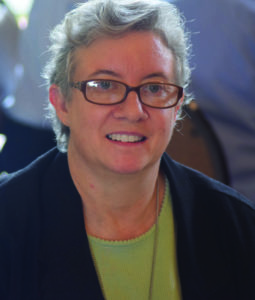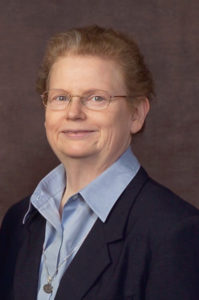
Salvatorian Sisters make a little go a long way
Sisters on the Front Lines began as a pilot project of Foundations and Donors Interested in Catholic Activities (FADICA) with GHR Foundation and the Sisters of Mercy of the Americas. It soon grew into a Catholic Extension program with a wider alliance of nonprofits. The goal: Make 1,000 grants of $1,000 each directly to Catholic Sisters to help people whose life struggles were compounded by the pandemic.

Sister Liza Segleau, SDS saw an opportunity to enhance support for her clients through Sisters on the Front Lines. She manages a Wisconsin Interdisciplinary Care Team (WICT) that assesses and intervenes for iCare members with complex medical and psychosocial needs. When Sr. Liza’s $1,000 grant was approved, she reached out to her care team to plan the best way to use the funds. News of the grant quickly made its way to iCare’s CEO-President, who offered a 200% match. With funds totaling $3,000, Sr. Lisa’s team helped a homeless expectant mother move into safe housing; a war veteran suffering from combat trauma avoid eviction; and a heart transplant candidate with limited resources pay for travel and lodging on frequent out-of-town medical appointments.
Sr. Liza says her work fulfills our Founder Blessed Francis Jordan’s vision for Salvatorians to dedicate our lives to serve wherever we are called. “iCare gives me a ‘boost’ in what I am called do. It’s the perfect environment and the perfect population for me to reach out to and walk with.”

Sister Patrice Colletti, SDS says COVID has begun to loosen its grip on the Lake Traverse Reservation tribal community she serves in northeast South Dakota. But she reminds us, “Mourning continues on many levels. The deaths of honored Elders and traditional spiritual leaders means a loss of the traditional language and culture.”
Sr. Patrice’s Front Lines grant is a blessing that has transformed an old storefont into WarCloud Drop In Center, named in memory of Paul WarCloud. He was a local artist, author and activist who dedicated his life to preserving tribal traditions and language until he died in 1973. The WarCloud Center is a safe gathering place for people of all ages who live on the streets, in abandoned buildings, in the woods north of town, or at the local shelter. The building rehab is led by young tribal member Dawn Ryan. Dawn’s father was tribal chairman when Sr. Patrice served on the reservation 35 years ago. He was a man of vision whose leadership guided the tribe toward greater self-sufficiency. With volunteer labor, Dawn is honoring his legacy.
The WarCoud Center is a place for folks to access COVID shots, get masks, speak with a nurse volunteer, and get rides to a COVID test site two miles away. Families also come to the center to check on loved ones who struggle with addiction or mental illness.
Sr. Patrice says, “People are working together to create a safe space where families can process some of the trauma of this difficult time. This project witnesses to Gospel values and traditional Dakotah values. The WarCloud Center is important to our reservation, but the grass roots effort that makes it possible is even more so. When people are part of creating a better life for their community, their families, it’s powerful.”

Sister Ellen Sinclair, SDS says, “Before the pandemic, I served as a pro bono attorney with the Legal Action of Wisconsin Eviction Defense Project (EDP). When the pandemic struck, I began meeting virtually with Milwaukee County residents facing eviction for a variety of reasons.”
In cities across the U.S., COVID-19 caused thousands of people to lose their job – and then their home. Milwaukee was no exception. Early on, the CARES Act moratorium offered some tenants a reprieve. Since September 2020, tenants eligible for the CDC Moratorium got a temporary stay. Still, Milwaukee County saw hundreds of eviction actions.
Sr. Ellen also received a $1,000 grant through Sisters on the Frontlines. She says, “By collaborating with Community Advocates, we provided $50-$100 debit cards to help a dozen families move from temporary shelter to stable housing. The cards allowed recipients to decide what they needed to make their new housing a home. They used the funds for a variety of needs from rental application fees and moving costs, to retrieving household goods from storage or replacing essential items left behind upon eviction. For those families in desperate circumstances, those modest funds preserved a degree of dignity.”
